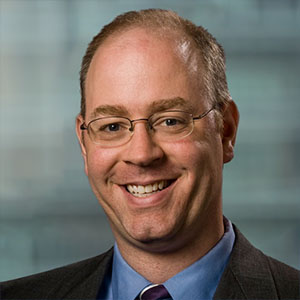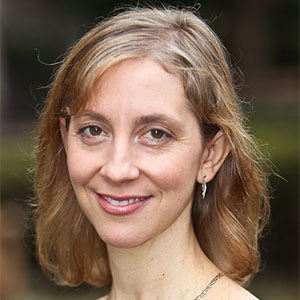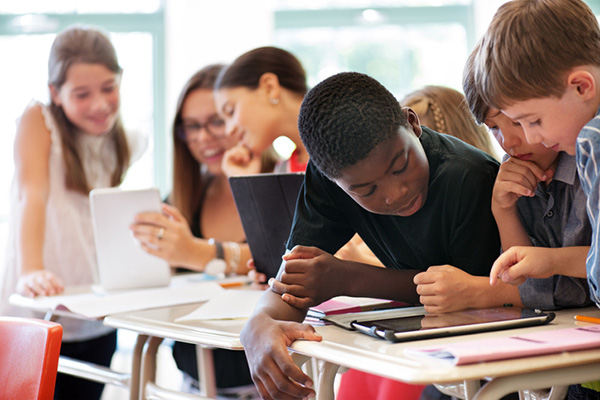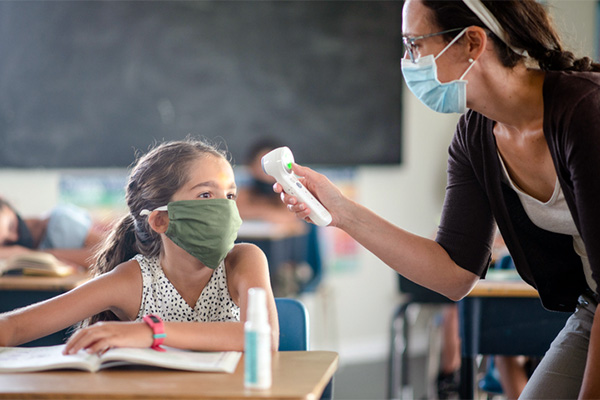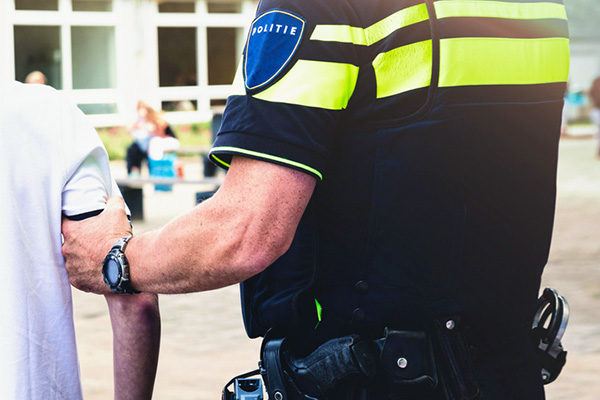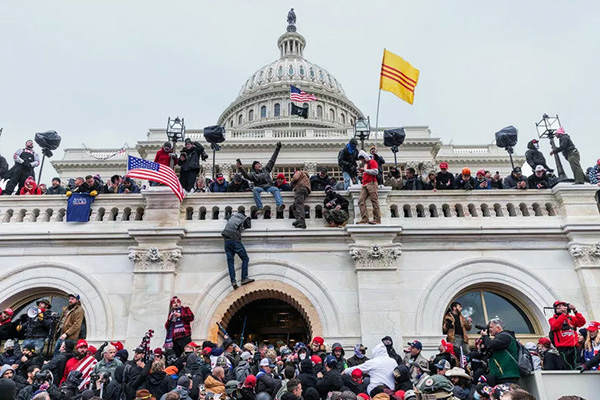Episode
April 28, 2021
Can the U.S. Education System Create Good Citizens? (25:02)
Americans are clearly divided in many ways, which makes civic engagement all the more important. But are Americans equipped with the knowledge they need? Americans’ lack of civic knowledge is fodder for comedians. But the consequences are far from amusing. In this episode, Rebecca Winthrop, co-director at the Center for Universal Education at the Brookings Institution, and Neal McCluskey, director of the Center for Educational Freedom at the Cato Institute discuss: can the U.S. education system create good citizens?
Transcript
Sallie James: Americans are clearly divided in many ways, which makes civic engagement all the more important.
MSNBC – Brian Williams: This might be the most critical time in decades to teach and encourage civics, our duties and rights as American citizens, how our government works, how it should work, what needs work right away.
Sallie James: But are Americans equipped with the knowledge they need?
Cartoon: He signed ya, Bill. Now you’re a law. Oh yeah!
CNN – Michael Smerconish: Do you think that most Americans could pass the new citizenship test?
CNN – Kenneth C. Davis: The answer is no if we go according to most surveys, most studies.
CBS This Morning: For all of its wisdom, the Constitution is in trouble for this reason: Most Americans do not know what’s in it.
Sallie James: Americans’ lack of civic knowledge is fodder for comedians.
Jimmy Kimmel: Name a member of Congress and we’ll give you a cookie.
Sallie James: But the consequences are far from amusing.
Soledad O’Brien: A group of high school students in Rhode Island is suing the state for failing to give them an education in civics.
CBS This Morning: What worries me the most about constitutional ignorance is the same worry that the framers had, that without constitutional education, the republic will collapse.
Sallie James: If Americans can broadly agree on nothing else, we should be able to agree that much of the bitterness and political tribalism that drives our public discussions is unhealthy for our country. In order to debate contentious public policy issues in a respectful and engaging manner without abandoning deeply held principles, the Cato Institute, in collaboration with the Brookings Institution, present Sphere. In this episode, can the U.S. education system create good citizens? Welcome to Sphere. I’m Sallie James. These have been fraught times politically, and it seems appropriate that on this show, one that has been designed specifically to model civil discourse around areas of disagreement, we should examine how we, as a society, are encouraging good civic-mindedness and civic behavior. Joining me today for this discussion are Rebecca Winthrop, co-director at the Center for Universal Education at the Brookings Institution, and Neal McCluskey, director of the Center for Educational Freedom at the Cato Institute. It’s my pleasure to welcome you both to Sphere. Rebecca, I’ll start with you to address the question at hand. Can the U.S. education system create good citizens?
Rebecca Winthrop: Well, I certainly hope so. I wouldn’t say it’s an automatic. I would not say that we’ve been uber-successful as a country, given that you know, one in four Americans can’t even name the three branches of government. So, I think the question of “can” also needs to look at “should.” And for me, I think a big part of the U.S. education system and frankly, any education system in a democracy, should be developing good citizens, active, engaged citizens who are civically minded.
Sallie James: Neal?
Neal McCluskey: Yeah, I am not optimistic that our education system can produce good citizens or civil discourse, which I think is part of being a good citizen is being civil with each other in the face of disagreement, tolerating other people’s views. But I think that our education system, far more than shaping our society, reflects our society. And to the extent that we are divided, a public school system is going to reflect those divisions. If we have democratic control of schools, which is what we’re aiming for with public schooling, but the people in that democracy are divided, those conflicts are going to make their way into the schools. I think school choice would be a way to diffuse some of this conflict. But again, if we have a populace that’s divided and doesn’t want to be civil with each other, that’s not going to do a whole lot to help, either. So, most basically, I think we can’t put too much stock in the ability of our school system to change a society that may be deeply divided and uncivil, because that school system is going to be shaped by that society much more than it is going to fix or create a new society.
Sallie James: Well, perhaps we should step back here a little bit and talk about what is a good citizen. So, Neal, what – I mean, you touched on some of these issues just now – what do you think? What sorts of behavior would represent good citizenship?
Neal McCluskey: Yeah. Ironically, this is one of the problems we have with civics education, is we don’t actually have a lot of agreement on what we want it to do. But I think at the base, we can see there’s some agreement. Certainly, we want students to know what their rights are, you know, that they have freedom of speech, freedom of religion, things like that. We want them to know how the system is supposed to work. We want them to know about federalism, and checks and balances, and things of that nature, and we want them to be tolerant of each other. Again, to recognize that we don’t all have to agree, but we have to respect the right of somebody we disagree with to speak in public or something like that. I think at a baseline we can agree on all those things. The difficulty comes in operationalizing it. What concrete things do you teach in the school? And I think that the biggest problems become especially what are the right attitudes to have? What does tolerance really mean? How far does tolerance go? But I do think we can agree that people should know the basics of how the government system is supposed to work, and that we need to allow other people to have freedom and to exercise their rights.
Sallie James: So, Rebecca, what are your thoughts on what constitutes a good citizen?
Rebecca Winthrop: I agree with a fair bit of what Neal just said, and I wanted to add something which I think perhaps a decade or two ago, Neal might have been right, that there isn’t a lot of agreement around what we think civic education should focus on in schools. But in the last decade, I think, there’s been – especially the last five years, to be honest – a really big movement within the civic education community in the U.S., there’s something called CivXNow, which has about 80, close to 80 organizations from all different sides of the political spectrum, ideological spectrum, who have sort of come to an agreement around three main things that they think are really important. And some of them are what Neal talked about. But there’s some additional things. One is civic knowledge, knowing the rules of the road, how our government works, essential for living in a democracy. Two is civic dispositions. Really, a lot of what Neal just talked about: civility, listening, being open to hearing other perspectives different from yourselves and engaging in a discussion. And a third is practicing behaviors. This whole idea of civic behavior, which is, you know, how we want people to engage in their communities and in the political life of society. And that goes far beyond just voting. It includes, you know, writing letters to their city councilman. It includes going over and talking to a neighbor who seems to be causing a problem to see if you can solve it. I mean, there’s many levels of sort of civic behavior, from sort of small and local right up to running for office yourself, et cetera.
Sallie James: So, it seems that from your answers you have similar thoughts about what good citizenship looks like. Tolerance, ability to civilly debate issues, but very different ideas about what it takes to get there. Would you agree with that broad assessment? Both of you?
Neal McCluskey: I’ll just say that I think that there are maybe tougher headwinds than Rebecca may think there are. It’s one thing, I think, to get people who work on civics sort of professionally to start to agree on, well, what is it we want to impart to students in civics? It strikes me that the much bigger problem is actually doing those things in schools. And so, for instance, we see that many parents don’t trust that teachers are going to teach civics, teach social studies, teach history, all things with direct impact on civics. They don’t trust that they’re going to teach them objectively. They don’t trust the sources that the teachers are using. We see that in the schools, actually, the Rand Corporation found that one of the biggest causes, most frequent causes of bullying is political disagreements. And so, my concern is not so much can we get civics educators, or people who think about civics, to agree on what should be in a civics curriculum, it’s how do you get that into the schools and working in a way that’s successful? And I’m not sure that we’ve seen that at scale.
Sallie James: It’s interesting you say that because in discussion – excuse me – in addition to this discussion series, Project Sphere comprises an education summit where we convene educators about how to conduct and elevate civil discourse and debate in the classrooms. And we found that the teachers are so grateful to have these tools because they need them to facilitate this type of civil dialogue, to facilitate a diversity of viewpoints, and to cultivate critical thinking. Rebecca, do you think more initiatives like that could help, do you think?
Rebecca Winthrop: I think they could, but really what I think part of the problem is, is we haven’t really tried very hard. We spend $50 annually on STEM and five cents a kid annually on civic education. So, I think, actually, Neal and I agree on a couple of things. We agree, it seems, on sort of the general gist of what it means to be a good citizen, and what those sort of knowledge, and dispositions, and behaviors might be. And I think we agree, and I very much agree, Neal, that schools reflect society and social norms. I mean, it’s not like people are wandering around in, you know, in their daily lives, going to the store, going to work, talking with their kids, and have one sort of set of beliefs, and then they enter a school building and become magically transformed or anything like that. Everywhere in the world, schools reflect social norms. So, I just think we diverge on what the solution is. To me, the takeaway is we need to try harder and do more in schools and in part I come to that conclusion because I don’t know what other social institutions out there we can rely on to try to build civic knowledge and behaviors, and we can’t assume it’ll just proof, be, you know, dump into people just because they’re born in a democratic country. It needs to be developed. I worry a lot about places that are called civic deserts. 60% of rural youth in America live in a civic desert, which is defined as a place where people can’t come together across different, you know, perspectives and try to solve a problem together. Now, if you live in a civic desert, you know, doesn’t school – there are schools everywhere, there are schools in every community. Can’t schools be that place where we try to build those habits? And I think we should just try harder. I agree with Neal, there’s big headwinds, but we should try harder and invest in what seems to work, and there’s been a number of studies on things that do work.
Neal McCluskey: I just want to say that I think we will definitely agree that a problem has been that civics and a lot of other topics that really aren’t STEM or English language arts have been pushed to the margins. So, the No Child Left Behind Act in 2002 basically evaluated schools on two things: how the kids did in English and how they did in math. That’s what a school was either rewarded or more often punished for. And everything else got pushed to the margins because they weren’t, you know, quote unquote held accountable for that. We – the good news is we’ve gotten away from that a little. So, in 2015, we passed the Every Student Succeeds Act. It’s decreased the degree to which every school was facing punishments based on their math and reading scores. And I think that we’ve seen the country move away a little from this obsession with, you know, a few things that we can test and that will be the end-all and be-all of assessing a school. So, the good news is at least we have – there’s a little bit less narrowing of what education means, and that may be making room for things like civics. The other thing I’m worried about, and I think again this is to a large extent outside of the control of the education system, is while people didn’t want that narrowing, I haven’t seen a great increase in demand for civics from parents. I do think we still tend to look at education as will this prepare my child to get a job and earn money and be secure in their lifetime? So, I think that a lot of what’s going to need to happen to get schools to focus more on civics is things like Sphere, things in civil society that touch everyone that’s outside of the school, to, you know, to cause an interest and a desire for better civics to percolate up all over. And then schools will start to reflect it. And maybe something like the disgraceful Capitol riot will raise in people’s consciousness the need for civics and that will help drive better civics education in school.
Rebecca Winthrop: Can I come in here because I wanted to, I really wanted to reinforce what Neal just said, because I think this is a point. We may have differences, but this is a really – a strong point of agreement. The demand for civics among parents is a real problem. We just, and I completely agree with Neal that we will need to try to quote unquote sell civics or do other initiatives to really increase that demand. We just did, at Brookings, we run a family engagement education network, and we just did a survey of 13 districts across the U.S., from California, Indiana, to Western Pennsylvania. And it’s not representative of the whole country, but in every single district, we – parents said, hardly any parents said developing citizenship skills was an important reason why they sent their kid to school and part of a good quality education. They were super, super focused on preparing kids for academics and post-secondary and, interestingly, I think to Neal’s point, in helping kids develop a personal sense of passion and self-knowledge. They weren’t even interested in workforce skills, actually. So, there is a mismatch there. And I do think sort of a broader type of engagement like Sphere and others would be important.
Sallie James: Neal, you’ve pointed out in a recent piece that Amanda Gorman, the poet laureate who spoke so eloquently at President Biden’s inauguration, attended a private school, one that you say allowed her to develop the skills that led to her incredible performance. You’ve also said that private schools allow for more freedom and diversity. Can you talk us through that? Or put another way, are you saying that increasing school choice will create better citizens?
Neal McCluskey: Yeah, well, so I think, first of all, that we have a lot of research evidence that private schools are producing graduates with better civic knowledge and with more of the sort of attitudes that we want them to have. So, there’s a number of studies that show, for instance, that graduates of private schools are more tolerant of people speaking in ways that may actually be insulting to those private school kids. Often, it’s would I allow somebody to speak in public insulting my religion? And these include studies that control for the demographics of kids who go to private schools, because private schools do tend to draw from wealthier, or draw wealthier people than public schools, on average. And so, the question is why is this? And we have some theories. I don’t think we have anything that’s proven, but one theory that I think has some support is that we run into a difficulty if we have schools that are supposed to take a lot of diverse people, and that’s what the goal of public schooling is, it doesn’t always meet this goal, but that is one of the goals. It takes a lot of diverse people and says, we’re going to bring you together, we’re going to build bridges among you by having you all in this school. And you’ll sort of hash out what differences you have in, hopefully, civil discussion. And it makes a lot of intuitive sense. But I think what we’ve often seen is that leads to kind of divisive conflict and also then a tendency to try and avoid controversial issues because people don’t want to start conflicts. And certainly, teachers and administrators don’t want to be accused of trying to push their viewpoints on students, whether that’s fair or unfair to them, those sorts of accusations come up. And so, at least in theory, I think that what may be happening is when we allow people to choose schools, they can choose schools that have more coherent curricula. It could be more coherent civics curricula, it could be more coherent science curricula, but what we’re interested in, civics, and history, and social studies, and to teach sort of more rigorous content. It also, I think, enables them to say here are the right attitudes to have. So, a private school, often a religious school, I speak of religion in particular because they often say, you know, serving others is part of our religion. They can say, you should do service learning. You should go out and help people in your community. And that’s part of what being a good person is, or a good citizen. It’s harder often for public schools to do that because some people say, well, the school shouldn’t be telling my child what to do, or what makes them right or wrong, and I’m sort of suspicious of this going out and volunteering. So, I think that if we have school choice, we may allow people to get more rigorous concrete content than they otherwise could.
Sallie James: Rebecca, you’ve written perhaps a little bit in contrast with what Neal is saying, that the pandemic has increased our appreciation of public schools. And by that, do you think the public school response to the pandemic and the new conditions of education around it has been better than the private school response? Or are you more saying that the pandemic has changed our vision of what public schools can be?
Rebecca Winthrop: I think I’m saying more the latter. I mean, I wouldn’t – on the public/private question, I wouldn’t necessarily disagree with Neal, that there – you know, private schools are, can be pretty good. And I would say it depends on the private school. They’re not all good. Not all public schools are good, right? There’s some great ones. There’s some bad ones. But the issue is how many private schools are there and, you know, what percentage of kids are actually being educated by private schools? And the vast majority are in the public systems. And you know, different districts have different levels of choice in them. And I think what I’m saying is that it’s probably a much bigger headwind to try to radically transform who is delivering education. We can certainly think about it differently and, you know, privatize the whole system, than it is – and I think that’s a bigger headwind than actually leaning into who is delivering education to most kids now, and trying to do it better. And to me, what the pandemic did is activate what we were talking about before, the demand, parents’ demand, communities’ demand, for schooling. It’s nothing like having your school taken away in a flash for communities to realize the many, many roles schools play. And I think completely, to Neal’s point, the least of parents’ concern was, you know, in the first couple weeks of the pandemic, was that their kids weren’t studying for their math or reading tests. That was the least of their concerns, right? The top concern was society is structured around schooling. I have to go to work. And what am I gonna do? My kids are at home. And for a lot of low-income parents, it’s places that kids get food, and they get access to healthcare. And so, I think there’s a much greater appreciation for the sort of wide range of things that schools, whatever type of school, that schools provide. But for me, I think there’s an even greater appreciation for public schools because they’re open to everybody.
Sallie James: All right, let’s wrap it up then with just the final thoughts. Rebecca, we’ll start with you.
Rebecca Winthrop: My big takeaway is that I agree with Neal that schools will not automatically reflect good civic engagement norms, but we really need to try much harder than we have in the past to help young people develop those norms. And that is really an important role that schools play in a democracy.
Sallie James: And Neal, final word goes to you.
Neal McCluskey: Sure. And I absolutely agree that we want to build good citizens. My concern is that the public system is sort of designed, it’s inherent to the public system, to cause conflict. So, to take diverse people and require them to enter conflict with each other because to get the schools to teach what you want, if you want one thing and somebody else wants something different, you’ve got to win a political contest to get what you want taught, so they may exacerbate polarization. I think if we have choice, we allow people to choose what they want. It doesn’t make that polarization worse. You can get more rigorous curriculum, but I think that regardless of the system we have, and I think this is where Rebecca and I would agree, we’ve got to get the people, this means primarily parents when it comes to education, but the people generally, to understand why civics is important, civic knowledge is important, and why sort of tolerant civic attitudes are important. Because if the public doesn’t already think those things are important, neither public nor private schools are very much going to reflect a desire to have kids raised with good civic attitudes and understanding of how, you know, American government and American society is supposed to work.
Sallie James: The purpose of Sphere is to debate and consider deeply contentious issues in a respectful forum. I thank both of you for doing that here with me today and providing such an excellent example of that. For more information about Sphere, please go to projectsphere.org. Thanks so much for watching.

